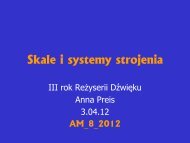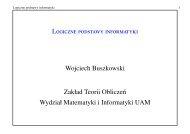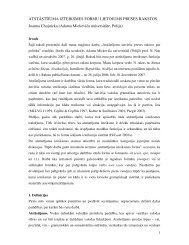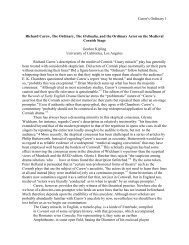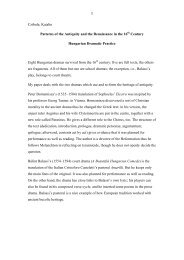Amir Weiner Getting to Know You
Amir Weiner Getting to Know You
Amir Weiner Getting to Know You
Create successful ePaper yourself
Turn your PDF publications into a flip-book with our unique Google optimized e-Paper software.
40 AMIR WEINER AND AIGI RAHI-TAMM<br />
radicalizing conduct on the ground. 111 More concretely, this modus operandi<br />
led <strong>to</strong> constant exaggeration by the reporting agencies. Guessing the will of<br />
the boss was never an easy task, especially because Stalin kept sending mixed<br />
messages and making U-turns in policies. After encouraging the brutalization<br />
of the Polish population during the first nine months of the annexation, on<br />
3 July 1940 Stalin abruptly ordered the L´viv party bosses <strong>to</strong> s<strong>to</strong>p harassing<br />
the Poles and focus on developing brotherly relations between Poles and<br />
Ukrainians. Addressing the issue of peasants seeking departure <strong>to</strong> Romania,<br />
Stalin wrote <strong>to</strong> Khrushchev on 2 April 1941 that “of course, shooting people<br />
is permissible, but shooting is not our main work method.” 112 But if the 1930s<br />
had taught people anything, it had taught them that it was better <strong>to</strong> err on the<br />
side of zeal and excess than on the side of compassion and precision. Always<br />
uncertain, Stalin’s lieutenants opted for zeal.<br />
Time and again, the result was conscious and deliberate collective<br />
targeting that placed terrorization of potential targets above studying them<br />
and paralyzing the entire suspicious environment rather than focusing<br />
on specific individuals. During the initial phase of the invasion of eastern<br />
Poland, Khrushchev did not hesitate <strong>to</strong> publicly assault a group of NKVD<br />
generals as invisible scum and scoundrels who wrote nonsensical reports and<br />
sat and chatted in the rear instead of carrying out executions. Ironically, one<br />
of the NKVD generals countered that they did shoot a number of people but<br />
would not do it without proper procedure. 113 Panteleimon Ponomarenko, the<br />
first secretary of the Belorussian Communist Party, showed more concern for<br />
precision when he declared that “we will not object <strong>to</strong> the peasants giving it <strong>to</strong><br />
them [the settlers] on the snout. It is arbitrariness that we will not <strong>to</strong>lerate… .<br />
Watch out that some Polish poor peasant [bedniak-poliak] is not classified as<br />
a settler and ends up starving.” 114<br />
But both Khrushchev and Ponomarenko ignored concerns over arbitrary<br />
identification of alleged enemies on the grounds that this was an integral<br />
component of revolutionary justice and savage class war. 115 These patterns<br />
111 On the lethal triad of all-powerful personal rule, lack of institutional integrity, and<br />
radicalizing impetus in both systems, see Hannah Arendt, The Origins of Totalitarianism, 3rd<br />
ed. (New York: Harvest, 1967), 389–437; and Ian Kershaw, Hitler, 1936–1945: Nemesis (New<br />
York: Nor<strong>to</strong>n, 2000), esp. chaps. 6 and 8.<br />
112 RGASPI f. 17, op. 167, d. 59, l. 26; d. 60, l. 2.<br />
113 Radians´ki orhany derzhavnoï bezpeky u 1939–chervni1941 r., 196–97.<br />
114 NARB f. 4, op. 21, d. 1764, ll. 15–16; d. 1521, l. 207; d. 1683, l. 19.<br />
115 Aleksander Wat, My Century, ed. and trans. Richard Lourie (New York: Nor<strong>to</strong>n, 1990),<br />
105–6; Tobias Privitelli, “Irredentism, Expansion, and the Liberation of the European<br />
Proletariat: Stalin’s Considerations on How <strong>to</strong> Bring Communism <strong>to</strong> the Western Neighbors<br />
of the Soviet Union, 1920–1941” (Ph.D. diss., University of Bern, Switzerland, 2008), 332.



